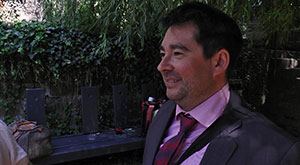Case Study: Postdoctoral Research Psychologist Living in Munich
Belinda Platt studied for her PhD in Experimental Psychology at the University of Oxford and moved to Munich with her German partner in 2012. Motivated by the desire to live abroad and learn German, Belinda has been working as a post-doctoral researcher in the Department of Child and Adolescent Psychiatry at the LMU University Hospital in Munich since 2013. She co-supervises three PhD students on projects investigating the role of parental depression in adolescent emotional development.
1. Can you tell us a little about your current research position/job?
I've been employed as a post-doctoral research psychologist in the Department of Child and Adolescent Psychiatry at the University Hospital of the LMU University in Munich since October 2013. The focus of my research is on understanding more about the causes of adolescent depression, and how we can improve treatment and prevention measures for young people. I run studies with patients from the clinic as well as families in Munich affected by depression. I co-supervise three PhD students and undergraduate students. I love my job!
2. How did you come to be working and/or studying in Germany?
I had the opportunity to move to Germany because my partner, who I met during my PhD, is from Munich and found a job there. I thought a couple of years living and working abroad would be good for me, but didn't expect to like it so much I would still be here nearly four years later!
3. How easy was it to find employment/a postdoctoral position in Germany?
Once I knew which positions to look for, I found a job within a couple of weeks. However, the whole application process including my CV, cover letter and the interview was in German. That wasn't easy. Since my field (child and adolescent mental health) requires knowledge of German, before I started to look for jobs I decided to learn German intensively (classes for 3 hours a day every day for 5 months). I was really lucky to be able to do that and see it as a good investment now.
4. What was the application process like (for the position you're in now)?
I found my current job through networking and by contacting my current professor directly. I would recommend that to anyone looking for a job here. I attended an interview and started work fairly soon afterwards.
5. How accessible is funding for postdoctoral studies/researchers or other academic positions in Germany?
The German research foundation (DFG) offers funding for post-doctoral researchers, which is something I'll be applying for. There are some other funding opportunities too. My impression, at least in comparison with the UK, is that post-doctoral funding is more readily available in Germany, but that since there are fewer permanent positions in Germany, moving beyond the post-doc phase can be more difficult.
6. What is the best thing about working and living in Germany as a postdoc?
I've learnt a lot about myself by living and working abroad in general. Dealing with the challenges of learning a language and a new culture has been really rewarding. I really enjoy the quality of life I can enjoy as a post-doc in Germany. The rent and cost of living are relatively low, particularly compared to the salary it's possible to earn.
7. Did you find language a barrier to your activities in Germany?
Language has definitely been an issue for me, but that is perhaps exaggerated because I'm working with young people and with patients. In addition to the barriers to finding a job, meetings with colleagues and collaborators can be more difficult. Most of the teaching I've done has also been in German, which requires more preparation time.
8. What tips would you give potential junior researchers or postdocs who wish to continue their studies or work in Germany?
My biggest tip would be to invest some time in learning German as soon as possible. It's possible to survive in Germany without speaking the language, but I think once you can speak German fluently, you can really enjoy it and feel at home.
Max Saved Jobs Reached
A maximum of 500 Saved Jobs can be created against your account. Please remove an existing Saved Job in order to add a new Saved Job.
Manage Saved Jobs








